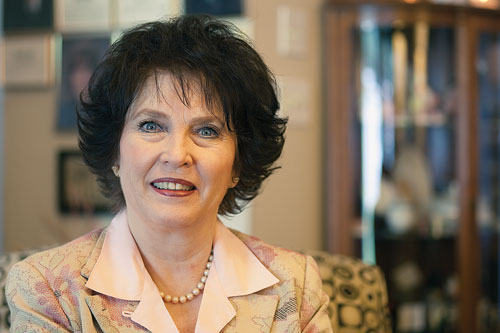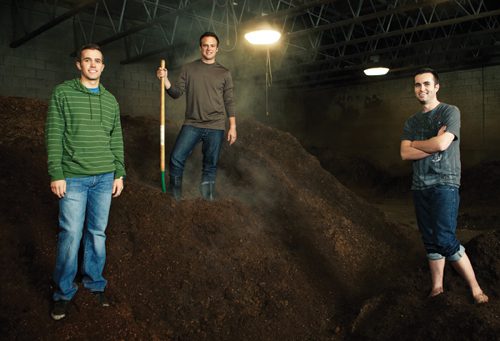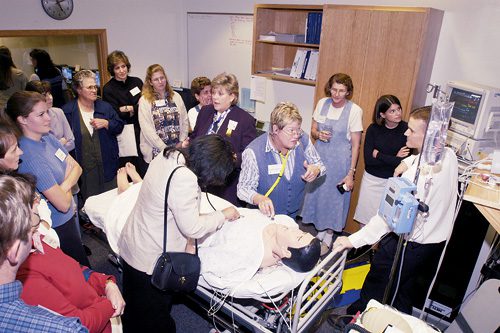Acts of charity—giving money, serving others, even donating blood—create a remarkable return, lifting us spiritually and financially.
In 1905 the famous industrialist John D. Rockefeller was quoted as saying, “God gave me my money.”1 Now, that’s sort of troubling to Christian people. God gave him his money? Some have used the quote as evidence that John D. Rockefeller was a bad man—that he believed he deserved to be rich when other people were poor. But that’s actually not what he meant.
A year later Rockefeller went on to tell a reporter from the New York American: “I believe the power to make money is a gift from God . . . to be developed and used to the best of our ability for the good of mankind.”2 Rockefeller believed that he made money because he was charged with helping others. He honestly believed that if he stopped giving his money in the right way then God would take his money away.
Entrepreneurs in this country are some of its most charitable citizens. For years I taught in a department of entrepreneurship and got to know modern John D. Rockefellers who believed they were rich partly because they gave. But, you know, I never believed it—never believed a word of it—because I was trained as an economist.
When students walk into their first class in economics, here’s what the professor doesn’t say: “You want to get rich? Give your money away.” It doesn’t make sense. No, the professor will tell you that you have to have money first, and then you can give it away. So I set out to test Rockefeller’s view that he was rich because he gave. That way, the next time I heard someone say you could get rich by giving your money away, I was going to respond: “No, you’re wrong. I have the data that say you have to have it before you can give it away.”
Giving in America
Americans give a lot. In 2006 they gave about $300 billion to charity. To put that into perspective, $300 billion is more than the entire national income of Sweden. Seventy-five percent of America’s families give every year. Fifty percent volunteer their time, and Americans give in myriad other ways that are not captured in data.
The most charitable state in the United States is Utah, where people give approximately twice as much as the second leading state. I’m tempted to say that that should make Utahns proud. But I suppose that’s not the right word. However, it should make you pleased—and determined to keep it up.
How do Americans compare in charitable giving with people around the world? There’s a perception out there, if you listen to politicians, that we’re stingy. Former president Jimmy Carter said in a relatively recent speech that Americans are indifferent to the suffering of the poor around the world: “Theirs is a different world from ours. And we don’t really care about what happens to them.”3
But the data say President Carter is wrong. If we look at how much money Americans give per capita compared to citizens in other countries of the world, we find that the average American citizen gives away three-and-a-half times as much money each year as the average French citizen, seven times as much as the average German, and 14 times as much as the average Italian.
Now, as an economist I want to know if that’s because we are richer. However, when you correct for income differences and tax differences, and all the things that make the United States a different country, you find that the gap doesn’t close.
Get First or Give First?
I intended to show that Rockefeller was wrong: that you have to have the money before you give it away and that we need tax policy that puts plenty of money in our pockets—then we’ll help each other.
Researchers at Harvard University collected data on 30,000 American families from 41 communities coast to coast in a comprehensive look at people’s service behavior and charitable giving. I eagerly anticipated these data because they were going to give me a statistical way to show that you have to have the money first.
I worked for months on my computer in my darkened office. My conclusion was, sure enough, that when people get richer, they tend to give more money away. But I also came up with the following counterintuitive finding—that when people give more money away, they tend to prosper.
Specifically, here’s what I found: Say you have two identical families—same religion, same race, same number of kids, same town, same level of education—everything’s the same, except that one family gives $100 more to charity than the second family. Then the giving family will earn on average $375 more in income than the non-giving family—and that’s statistically attributable to the gift.
Now I was perplexed. The data completely contradicted the theory that I’d always worked under. So I did what college professors always do in this case: I got rid of the data. I got new software. I looked for new data. I recrunched the numbers. But I kept coming up with the same thing.
I ran the numbers again and looked at volunteering. I found the same thing: People who volunteer do better financially. I ran the numbers on blood donations. Think about that—giving blood. You’re not going to get richer if you give blood, are you? Well, yes, you are.
I figured it couldn’t be right, so I ignored the findings. I didn’t publish them. Then I decided to look at the whole United States and see how charitable giving had changed over a 50-year period and compare it to how income had changed.
I examined the average American family between 1954 and 2004 and found (adjusted for inflation) a 150-percent increase in real purchasing power. Family charitable giving also increased over the same period—on average by 190 percent. What this says is that we’re getting more prosperous in this country, and we’re getting even more generous over time. This result tells me once again that what Jimmy Carter said about this country is not right. We’re not a stingy country. Could we be more generous? Of course we could. But we’re not getting stingier.
So what do we conclude? Is income driving up donations or are donations driving up income? The answer is both. When our country gets richer, people give more away. And as we give more away, that translates into economic growth for our country.
If we were to increase our private charitable donations by just 1 percent, which is about $2 billion a year, that would translate into a gross domestic product of about 39 billion new dollars. If I can take your $2 billion in charity and turn it into $39 billion, then suddenly charitable giving is not just a great investment for you. It’s also a patriotic act for our country because it translates into jobs, growth, opportunity, and tax revenues.
The Happy Result of Giving
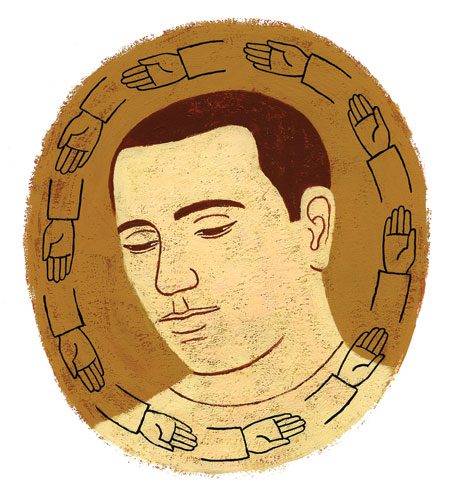 The more I ran the numbers, the more I kept getting this crazy result. But still I refused to believe it. In desperation I finally went to a colleague who specialized in the psychology of charitable giving. “I’m getting this result I can’t understand,” I told him. “It doesn’t make sense. It’s like the hand of God or something on the economy, and I can’t believe it’s true.”
The more I ran the numbers, the more I kept getting this crazy result. But still I refused to believe it. In desperation I finally went to a colleague who specialized in the psychology of charitable giving. “I’m getting this result I can’t understand,” I told him. “It doesn’t make sense. It’s like the hand of God or something on the economy, and I can’t believe it’s true.”
“Why don’t you believe it’s true?” he asked me. “You’re a Christian, aren’t you?”
This shook me a bit, but just for a second. “Yeah, but I’m also a social scientist,” I shot back. “We’re not supposed to believe those things. I need a more earthbound explanation.”
“Well, I’ll give you one,” he said. “We’ve known this for 30 years in the psychology profession. You economists— you worry about money all the time, and money is boring. We worry about something that people really care about—the currency by which we really spend our days—and that’s happiness. We’ve known for 30 years that people who give get happier as a result.”
Now I knew from teaching at a business school that the best way to run a successful business is to hire happy people. If you want to be a productive person, work on your happiness. Happy people show up for work more, work longer hours, work more joyfully, and are happier with every aspect of their productive lives. Happiness is the secret to success. Charity brings happiness, and happiness brings success.
People who give to charity are 43 percent more likely than people who don’t give to say they’re very happy people. People who give blood are twice as likely to say they’re very happy people as people who don’t. People who volunteer are happier. You simply can’t find any kind of service that won’t make you happier.
Studies show that when people give, it lowers their levels of stress. People who do their jobs with less stress tend to be more productive and successful. Throughout our lives, if we can find ways to relax, we will profit from it.
Leaders Give
A study from the University of Kent in southern England was dedicated to figuring out how people perceive givers. Researchers conducted an experiment called a “cooperation game” in which a group of people were given a small amount of money and asked to contribute to a common fund. Next, the researchers doubled the common fund and passed it out equally among the participants. In this game, the best thing for everybody to do is to put in all of their money and have it doubled. But if you’re crafty, rather than cooperate you’ll be tempted to hold back all your money when everybody else puts in theirs. That means that you get your own money and a chunk of everybody else’s. And as the experiment showed, there is always a proportion of people who opt to do so.
But then the researchers conducted a second phase of the experiment in which the participants had to break up into teams and elect leaders. They found that 82 percent of the leaders who were elected were the biggest givers from the first phase.
The study concludes that when people see strangers giving charitably, they recognize a leadership quality in those strangers. If people witness you as a giver, they will see a leader. Servant leadership is a secret to success, whether you’re looking for success or not. When people see you giving and cooperating and serving others, they will see in you a leader, or a future leader, and they cannot help but help you.
Many other studies show that givers have better health, that givers are better citizens—it goes on and on. The bottom line is this: Givers are healthier, happier, and richer in this country—and probably around the world. Giving creates stronger communities and a more prosperous nation.
The question for me now is this: Who gives the most? And who’s getting this wonderful benefit for themselves and their communities?
The number one characteristic of those who give in this country is that they practice a faith. Of people who attend worship services every week, 91 percent give to charity each year. Of people who don’t attend every week, 66 percent give. This translates into millions of people who are healthier, happier, and more prosperous than their neighbors, and it charts back to their religious experiences.
What do the data tell me as a Christian man? They tell me that people who take their faith seriously are the beneficiaries of giving because we tend to give a lot. We’ve been taught to do what is right, and we are reaping the reward.
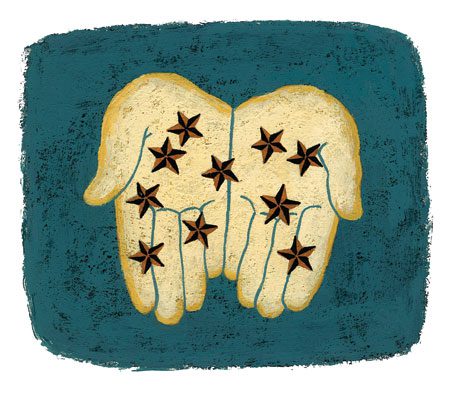 Give the Gift of Giving
Give the Gift of Giving
How can we reinterpret the scriptures about charitable giving? How can we take it to the next level?
Consider Mosiah 4:21:
And now, if God, who has created you, on whom you are dependent for your lives and for all that ye have and are, doth grant unto you whatsoever ye ask that is right, in faith, believing that ye shall receive, O then, how ye ought to impart of the substance that ye have one to another.
The traditional interpretation of this passage, which is similar to passages in any sacred text, is basically this: “Give more to other people. You have so much; give more.” Take it to the next level. You have been given the gift of giving. Help others by giving them the gift of giving.
How are you going to help somebody to give more today? There are a lot of ways to do it. Let me tell you how you’ve done it for me.
Let me tell you a quick story about my “magic” BYU briefcase. I visited here in the fall of 2007 for the first time. My friend Gary Cornia, who is dean of the business school, gave me a beautiful briefcase that said “Brigham Young University” on it. I took it home and put it away because I already had a briefcase.
About a month later my briefcase broke. So I put all my stuff in the BYU briefcase and started carrying it. I travel a lot, and one thing I noticed is how people would read the three words on the briefcase, look at me, and think, “He’s a Mormon guy.” (And that’s actually false religious advertising because I’m a Roman Catholic.)
So I was walking around saying “I’m a Mormon,” and the funny thing is that it was changing my personality. I was mortified that somebody would say, “You know, I was in the airport, and I saw this Mormon guy, and he was being a real jerk.” I wanted to live up to someone else’s reputation, and it was making me into a better person. It was a magic briefcase.
So what’s the implication of this story? Well, it might just be that I’m trying to get a new briefcase right now. (Maybe the greatest kind of evangelization that the LDS Church could undertake would be to buy 300 million briefcases and give them out to all Americans.) But the bigger point here is that carrying that briefcase was actually making my life better. Things were going really well for me as I was carrying it. And the reason is that the service for which Mormons have become justifiably famous was infecting my life. It was making me a better person.
Dispel the Myths of Giving
So how else (besides buying somebody a briefcase) can you help other people give more today? First, you can help to dispel some myths about charitable giving.
Myth number one: Giving makes us poorer. You hear this all the time. This is what the economist like me thinks. It’s wrong, and you have to fight it. And there are arguments that say it’s not just the hand of God—at least not directly the hand of God. Instead, maybe it’s the hand of God through our neurochemistry, the way giving changes the structure of our brains. But there are good explanations for why this myth is not true.
Myth number two: People are naturally selfish. I hear this constantly. People are selfish, it’s true, but they’re not naturally selfish; people are unnaturally selfish. When we are our best selves, when we are in equilibrium, when we are where we’re supposed to be cognitively, neurochemically, and spiritually, then we are giving people.
Myth number three: Giving is a luxury. It’s not. It’s a necessity—the first 10 percent, not the last 10 percent. And the reason is that if we want to be better, we have to give.
Myth number four: You will hear in the coming days and weeks and months that if our country were doing what it should be doing for people in need, then we wouldn’t need private giving, that the government would be taking care of people who need it, and that we would not need you to step in to provide for others. I am here to tell you, having looked at the data, that the day the government takes over for you in your private charity is the day we get poorer, unhappier, and unhealthier. We must demand to take our place as givers and support the communities and people who need the services we can provide.
The second way you can help other people give more is to remember that somebody is always watching you. You’re always creating an example, and, as such, you’re a teacher. Make sure that it’s clear that you’re a charitable giver—and others will emulate you.
And a third way is to use your creativity to teach giving. How can we bring our creativity to bear more in our families, in our churches? How can we create a curriculum where giving is a core competency? We’re not very good at teaching giving; yet this is a core competency for successful citizenship and a happy life. We need to be better about teaching it.
We need to discover more creative solutions to working these concepts into our everyday life. This has changed my life a lot. When I was working on this research four years ago, I came home with a chapter from a book that showed these data analyses. My wife read it and said, “I think this is really something. I think we can use this.”
“Yeah, we should give more,” I answered. “We should write bigger checks. We should take this seriously.”
She said, “No. I think we should do something bigger. I think we should adopt a baby.”
And I said, “Sweetheart, it’s only a book.”
But I had no argument. We had to do it. And we did it. It was the best thing we ever did. And that changed our life even more.
I promise you that this really works. Either because of God in heaven—or because of our neurochemistry. But it really works.
I’m a happy prosperous person because I live in a country with people who serve. Because you give to your churches and the causes that you care about in Utah, I have a richer, happier, and healthier life (even though I live in Washington, D.C.). For that, I thank you.
NOTES
1. Reo Bennett, “How the Richest Man in the World Observes Christmas,” Woman’s Home Companion, December 1905, p. 14
2. William Hoster, quoted in Jules Abels, The Rockefeller Billions: The Story of the World’s Most Stupendous Fortune [New York: Macmillan, 1965], 279–80
3. 16th Annual Nobel Peace Prize Forum, Feb. 21, 2004, St. Olaf College, Northfield, Minn.
Arthur C. Brooks is president of the American Enterprise Institute. This is adapted from a forum address given on February 24, 2009.
Feedback: Send comments on this article to magazine@byu.edu.
Web: This forum is available in various formats at the BYU Speeches Web site, speeches.byu.edu.








